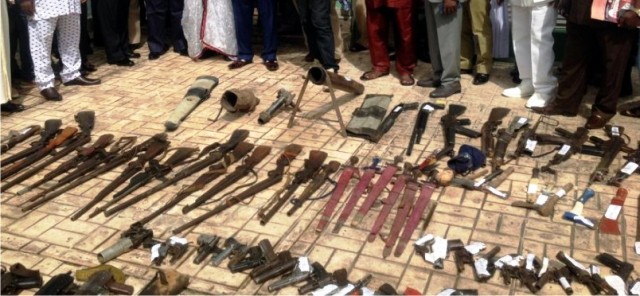Editorial
Another Amnesty Window For Ogoni

Penultimate Friday, the Rivers State Governor, Chief Nyesom Wike, in a bid to address the rising cases of cultism, violence and killings in Ogoniland, offered the criminals in the area, another opportunity to redeem themselves. The governor announced plans to extend the Amnesty initiative to cultists and criminals in Ogoniland.
Announcing the gesture at the destruction of arms and ammunition recovered during the 60-day disarmament of the Rivers State Amnesty Programme at the Igwuruta Shooting Range in Ikwerre Local Government Area of the state, Wike said cultists will not be allowed to disturb Ogoniland while other parts of the state enjoy peace.
“I direct the security agencies to work with the Special Adviser on Amnesty to work out a special amnesty programme for Ogoniland. We will ensure that Ogoniland is free.
“We must ensure that calm returns to Ogoniland just as we have in Port Harcourt and its environs”, Wike directed.
The Tide considers the governor’s gesture as a rare opportunity cultists and criminals in Ogoniland must seize with both hands.
As the amnesty programme of Ogoniland gets underway, we cannot fail to commend the single-mindedness of the governor in bending over backward, as it were, to contrive this new package in response to renewed violence, killings and sacking of communities by cultists and criminals in the area in recent times.
Again, the current efforts by the present administration to make Rivers a first choice destination for investment globally, requires total peace in the state. As the saying goes, a chain is as strong as its weakest link.
It is against this backdrop, that the sagacity and statesmanship of the governor must be appreciated and rewarded by Ogoniland and all stakeholders in the amnesty programme for the area.
Traditional rulers, community leaders and Community Development Committees (CDCs), as well as socio-cultural groups in Ogoniland, including the Movement for the Survival of Ogoni People (MOSOP) and KAGOTE have an onerous role to play in counseling youths involved in cultism and criminality against such vices since they know them and live with them.
Parents and relations of these cultists and criminals should also prevail on them to embrace the opportunity to lay down their arms, be re-integrated and offered skills for survival.
Often times, kingship and chieftaincy contests as well as land disputes afford these criminals and cultists employment, as feuding parties engage them to commit crimes. It is, therefore, time for community leaders to lead the way to peace by being exemplary and shunning squabbles.
Sadly, the performance of security agents in Ogoniland, especially the Police, leaves much to be desired, but they can redeem themselves by ensuring the success of the new amnesty programme for Ogoniland.
The Police and other security agencies deployed to quell the wave of violence and killings in the area must apply circumspection and carefulness so as not to discourage militants, cultists and criminals from coming out from their hiding to surrender arms and ammunition and embrace the olive branch extended by the govenment.
Given the peaceful, protracted, trail-blazing and historic struggle of the Ogonis against exploitation and environmental despoliation, peace appears the only factor standing between them and reward for their struggles.
The United Nations Environmental Programme (UNEP) report clean-up programme, which is a prize for their struggles, cannot be implemented in Ogoniland without peace. It is, therefore, imperative that the Ogonis must embrace the amnesty programme, specially packaged for them, in order to make valid progress in their quest for a remediated environment and better living conditions.
The Tide sympathises with those who have lost loved ones and property in the current wave of violence in Ogoniland, especially in Bomu and Lewe communities in Gokana Local Government Area. We, therefore, urge the state and local governments to ensure immediate and speedy resettlement of the affected persons to enable them carry on with their lives in their traditional environment as soon as normalcy returns to their domains.
The Ogoni youth, especially those who failed to take advantage of the previous amnesty programme, must see this special one as the last window for peace and reconciliation and opportunity to return to the normal life of a respectable Rivers citizen.
Editorial
Resolve Rumuwoji Market Issues, Others

Editorial
As NDG Ends Season 2

Editorial
Beginning A New Dawn At RSNC

-

 News5 days ago
News5 days agoAmend Constitution To Accommodate State Police, Tinubu Tells Senators
-

 Politics5 days ago
Politics5 days agoSenate Urges Tinubu To Sack CAC Boss
-
Business5 days ago
Crisis Response: EU-project Delivers New Vet. Clinic To Katsina Govt.
-
Business5 days ago
President Tinubu Approves Extension Ban On Raw Shea Nut Export
-

 News5 days ago
News5 days agoDisu Takes Over As New IGP …Declares Total War On Corruption, Impunity
-
Business5 days ago
Fidelity Bank To Empower Women With Sustainable Entrepreneurship Skills, HAP2.0
-
Business5 days ago
President Tinubu Extends Raw Shea Nuts Export Ban To 2027
-
Sports5 days ago
NDG: Rivers Coach Appeal To NDDC In Talent Discovery

